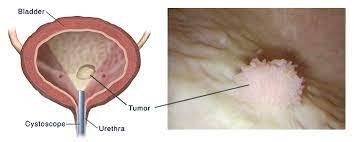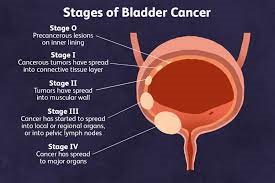Bladder cancer is a type of cancer that develops in the lining of the bladder, a hollow organ in the pelvis that stores urine.
How common is Bladder Cancer?
Bladder cancer is the 7th most common type of cancer in the UK, accounting for approximately 3% of all new cancer cases. According to Cancer Research UK, an estimated 10,200 new cases of bladder cancer will be diagnosed in the UK in 2021, with approximately 5,400 deaths from the disease.
Bladder cancer is more common in men than women, with a male-to-female ratio of about 3:1. The risk of bladder cancer increases with age, with the majority of cases occurring in people over the age of 50. However, bladder cancer can also affect younger people, particularly those who have been exposed to certain environmental or occupational risk factors.
What causes Bladder Cancer?
Some of the most common risk factors for bladder cancer in the UK include:
- Smoking: Cigarette smoking is the most significant risk factor for bladder cancer, accounting for approximately half of all cases.
- Exposure to chemicals: Exposure to certain chemicals, such as those used in the manufacturing of dyes, rubber, textiles, and leather, has been linked to an increased risk of bladder cancer.
- Chronic bladder infections: People who have had multiple bladder infections or long-term catheter use may be at increased risk for bladder cancer.
- Family history: A family history of bladder cancer can increase the risk of developing the disease.
What are the symptoms of Bladder Cancer?
While bladder cancer is relatively uncommon, it is important to be aware of the symptoms so that you can seek medical attention if needed.
One of the most common symptoms of bladder cancer is blood in the urine, also known as hematuria. The urine may appear pink, red, or dark brown in colour, and the blood may be visible to the naked eye or detected only under a microscope. Blood in the urine is usually painless and can occur intermittently.
Painful Urination
Another symptom of bladder cancer is painful urination, also known as dysuria. This can feel like a burning or stinging sensation when passing urine. However, it is important to note that painful urination can also be a symptom of other conditions, such as urinary tract infections.
Frequent Urination
Bladder cancer can also cause a need to urinate more frequently than usual, known as urinary frequency. This can be due to irritation of the bladder lining by cancer and can be accompanied by feelings of urgency or an inability to fully empty the bladder.
Lower Back Pain
In some cases, bladder cancer can cause pain in the lower back, particularly if the cancer has spread to nearby tissues or organs.
Unintentional Weight Loss
Unintentional weight loss is another symptom of bladder cancer, although it is less common. This can result from the cancer affecting the body’s metabolism or other factors related to the cancer.
It is important to note that other conditions can also cause these symptoms, so if you are experiencing any of these symptoms, it is important to seek medical attention to determine the underlying cause.
How is Bladder Cancer diagnosed?
There are several tests and procedures that may be used to diagnose bladder cancer, including:
- Urine cytology: This is a laboratory test in which urine samples are examined under a microscope for abnormal cells that may indicate the presence of cancer.

- Imaging tests: Imaging tests, such as a computed tomography (CT) scan or magnetic resonance imaging (MRI), may be used to help identify any abnormalities in the bladder or surrounding tissues.
- Cystoscopy: This is a procedure in which a healthcare provider inserts a thin, flexible tube with a camera into the bladder to examine the lining for signs of cancer.
- Biopsy: If an abnormality is found during a cystoscopy, a biopsy may be performed to remove a small sample of tissue for examination under a microscope.
How is Bladder Cancer treated?
While bladder cancer is a relatively common type of cancer in the UK, it is also highly treatable, particularly when caught early.
Treatment options for bladder cancer may include surgery, chemotherapy, radiation therapy, or a combination of these treatments. Your treatment plan will depend on the stage and location of your cancer, as well as your overall health and other factors.
Surgery
Surgery is the most common treatment for bladder cancer. The type of surgery performed depends on the stage and location of the cancer. Transurethral resection of bladder tumour (TURBT) is a minimally invasive surgery that is used to remove small, early-stage tumours from the bladder lining. Partial or radical cystectomy may be recommended for larger or more advanced tumours, which involve removing part or all of the bladder.
Chemotherapy
Chemotherapy is a systemic treatment that uses drugs to kill cancer cells. It can be used before or after surgery or as the primary treatment for bladder cancer that has spread beyond the bladder. Chemotherapy can be given intravenously or directly into the bladder, depending on the stage and location of the cancer.
Radiation Therapy
Radiation therapy uses high-energy rays to kill cancer cells. It may be used as the primary treatment for early-stage bladder cancer or in combination with surgery or chemotherapy for more advanced cases. Radiation therapy can be delivered externally or internally through a catheter inserted into the bladder.
Immunotherapy
Immunotherapy is a type of cancer treatment that uses the body’s own immune system to fight cancer cells. It may be recommended for bladder cancer that has spread or come back after treatment. Immunotherapy drugs work by stimulating the immune system to attack cancer cells.
Clinical Trials
Clinical trials are studies that test new treatments or combinations of treatments for bladder cancer. They may offer promising new options for patients who have exhausted other treatment options. Patients can talk to their healthcare provider about clinical trial options.
The stages of Bladder Cancer?

What are the life expectancy and survival rates with Bladder Cancer? Is Bladder Cancer curable?
Survival rates for bladder cancer in the UK depend on various factors, such as the stage of the cancer, the age and overall health of the patient, and the type of treatment received.
According to Cancer Research UK, the five-year survival rate for bladder cancer in the UK is around 60%. This means that 60 out of 100 people diagnosed with bladder cancer will survive for at least five years after their diagnosis. The survival rate varies depending on the stage of the cancer at diagnosis. The five-year survival rate for bladder cancer diagnosed at an early stage is around 80%, while the five-year survival rate for bladder cancer diagnosed at a late stage is around 25%.
It is important to note that survival rates are estimates based on large groups of people with the same type and stage of cancer. Individual survival rates may vary depending on factors such as the patient’s age, general health, and response to treatment.
The good news is that bladder cancer is treatable, especially if detected early. Treatment options for bladder cancer include surgery, chemotherapy, radiation therapy, immunotherapy, and clinical trials. The treatment plan depends on the stage and location of the cancer, as well as the overall health of the patient.
Regular check-ups and follow-up appointments with a urologist are essential for detecting any signs of bladder cancer recurrence or progression. Patients should also be vigilant about any symptoms associated with bladder cancer, such as blood in the urine, pain during urination, and frequent urination.
Conclusion:
Bladder cancer is a significant health concern in the UK, but there are many effective treatment options available. If you are at risk for bladder cancer or are experiencing symptoms, it is important to talk to your GP about appropriate testing and screening options. Early detection and treatment can help improve outcomes and quality of life for those with bladder cancer.
By understanding the risk factors and symptoms of bladder cancer, you can take steps to reduce your risk and seek prompt medical attention if you suspect you may have the disease.
Author: Mr Neil A Haldar MD FRCS UROL
Consultant Urological Surgeon
The Pelvic Specialists
